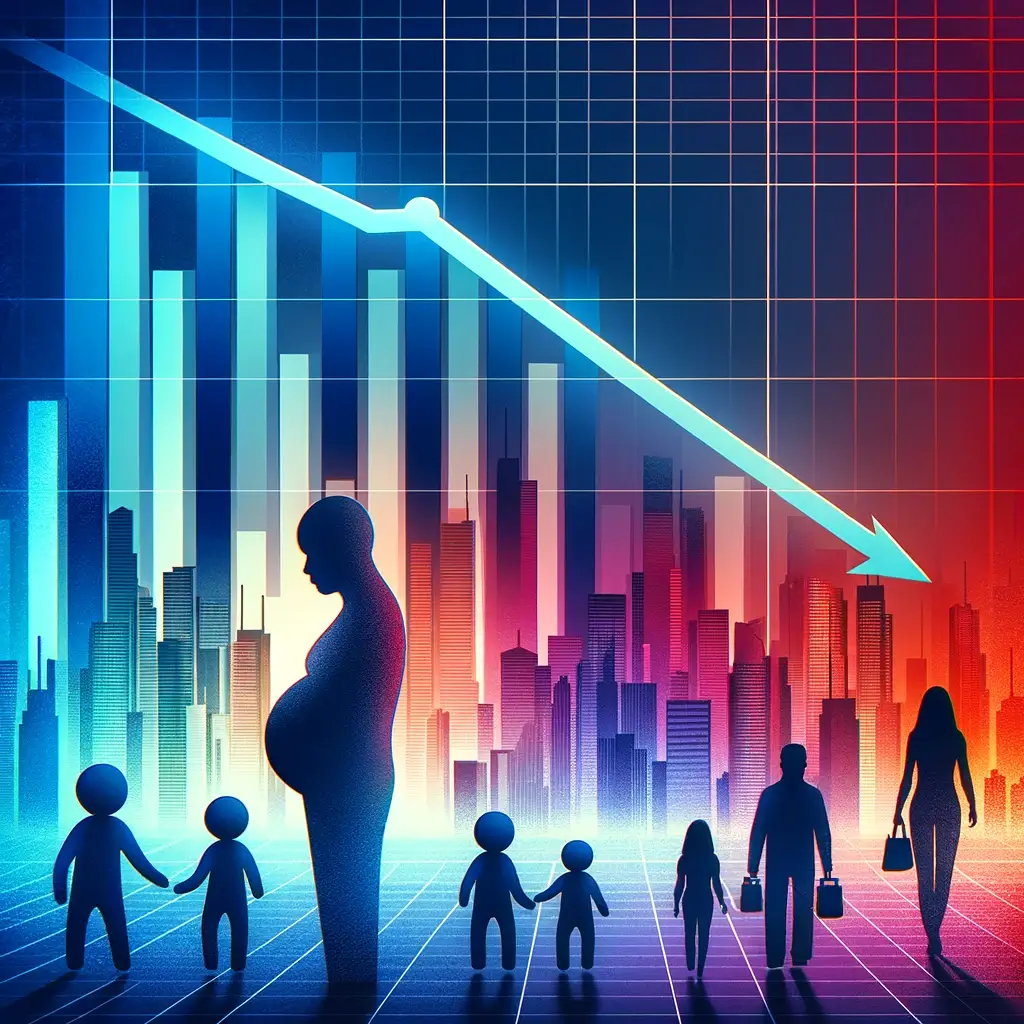Elon Musk: “I think one of the biggest risks to civilization is the low birth rate and the rapidly declining birth rate. And yet, so many people, including smart people, think that there are too many people in the world and think that the population is growing out of control. It’s completely the opposite. Please look at the numbers – if people don’t have more children, civilization is going to crumble, mark my words.”
Humanity takes up very little of Earth’s surface area – you can fit the entire population of Earth in New York City on one floor – Wait but Why
In one sentence: Birth rates are falling because the cost of living is going up as we transition from an industrial economy to an information economy.
Birth rates are falling worldwide
This presents are challenge for governments and people worldwide.
Falling birth rates are bad for economies and governments and people.
Governments are scrambling to do something to prevent it.
But WHY is it happening?
People always point to these reasons:
- Existing age-sex structure.
- Availability of family planning services.
- Social and religious beliefs – especially in relation to contraception and abortion.
- Rising living costs
- Female employment and education and not wanting to have bigger families for career sacrifice.
But they don’t get to the underlying core reason to why it is happening.
This is what I believe to be the answer.
In the past, we had a the following stages of human progress which can be loosely written as follows:
- Nomadic Tribal Economy – Hunter Gatherer
- Agrarian Economy – Farmers
- Merchant Economy – Traders
- Industrial Economy – Factories
- Information Economy – Internet
Through each of these stages society developed in different ways. The second and third stage is where the church and religion was most dominant in western society. The factory age is the age of nation states.
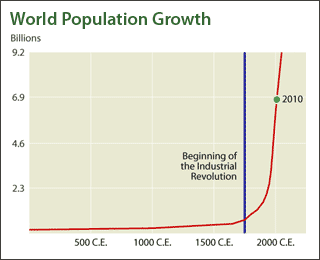
Because of the traders age and then the industrial revolution we saw huge efficiencies and a massive increase in production by combining people together in factories which made society wealthy and people better off. They were then able to expand their population faster than ever before in human history.
As Adam Smith said
“In a pin factory, when workers specialize in different tasks, they can produce a lot more pins together than if each person made pins from start to finish. For example, one person might draw out the wire, another might cut it, and another might put on the head. By dividing the work like this, ten workers could make about 48,000 pins in a day. If they didn’t specialize and each worked alone, they might only make 20 pins each, or 200 pins in total. So, specialization and division of labor can greatly increase productivity.”
What made this population explode? There was much more wealth and it was distributed equally among the people. We also saw an increase in living standards and healthcare which meant the infant mortality fell.
Peter Drucker: “The most important, and indeed the truly unique, contribution of management in the 20th century was the fifty-fold increase in the productivity of the manual worker in manufacturing.”
An important concept is that of carrying capacity.
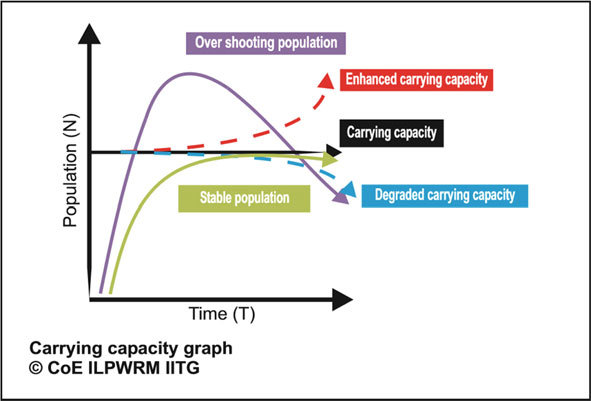
The concept of carrying capacity refers to the maximum population size of a particular species that an environment can sustain indefinitely, given the availability of resources such as food, water, shelter, and other necessary elements for life. This concept is commonly used in ecology, environmental science, and population biology to understand the limits of sustainable growth and the potential for overpopulation.
Carrying capacity is not a fixed number but can vary over time and depend on various factors, including:
- Resource Availability: The amount and quality of resources like food, water, and habitat can determine how many individuals an environment can support.
- Environmental Conditions: Factors such as climate, weather patterns, and natural disasters can impact the carrying capacity of an ecosystem.
- Technological and Social Innovations: In human populations, advancements in agriculture, medicine, and infrastructure can increase the carrying capacity by improving resource availability and living conditions.
- Interactions with Other Species: Predation, competition, and symbiotic relationships can also affect the carrying capacity for a particular species.
When a population exceeds its carrying capacity, it can lead to environmental degradation, resource depletion, and a decline in population size as the ecosystem can no longer support the excess individuals. Understanding and managing carrying capacity is crucial for sustainable development and conservation efforts.
With this huge wealth increase and rising middle class. It did not matter how productive or how efficient each person was. The important factor was having economies of scale. 10,000 people working together less efficiently would beat a company with 10 people and drive them out of business. Therefore rates were standardised and people were paid the same. It was the age of equality. Because there were so many workers they could organise together into unions and demand higher salaries or take control of the factory.
We also saw the rise and strengthening of the nation-state. It was important in this stage that countries and governments grew and became more powerful so they could protect against other countries. In the government, just like industry, scale was more important than efficiency.
But we are now entering a new era.
Enter the Digital Internet Age
“The Information Age is the third great economic revolution in the history of mankind… This new epoch will reorder the human condition more fundamentally than any since the discovery of fire and the invention of the wheel.” The Sovereign Individual
Now we have new technology and a new era and way of working. The industrial age is over, we are now in the internet age, and our society is reorganising.
This is a different stage of development from the makers stage. Scale is no longer important, but efficiency is more important.
The market is moving from Economies of Scale, to Economies of Efficiency
Traditionally, economies of scale were the primary focus for many businesses, where increasing production volume would lead to lower costs per unit, giving large companies a competitive advantage. However, in the digital era, technology and data analytics have enabled businesses to focus more on efficiency, optimizing operations and creating value with fewer resources.
Economies of efficiency emphasize using technology to streamline processes, reduce waste, and enhance customer experiences. This shift allows even smaller companies to compete effectively by leveraging data, automation, and digital platforms to operate more efficiently and respond quickly to market changes. It’s a trend that reflects the growing importance of agility, innovation, and sustainability in the modern economy.
Content is can be replicated for free, which means one person can create software that turns into billions of dollars.
Small companies such as instagram and whatsapp can sell for billions of dollars because of their use of technology.
The dating market is one example of this. As people move to dating apps and social media, the dating market has changed. People used to have a dating market of only those in their town, but now it is more global and there is more competition.
The elite are increasingly globally mobile.
Competition has opened up and the labour market and the digital market and the information market and to some extent the dating market is no longer local or national but global.
Governments that are large and succeeded in the industrial age because of their size and wealth are now inefficient compared to smaller ones where the scale advantage counts for nothing. It becomes a worse idea to live in a “developed – high-tax” country compared to a city state like UAE or Singapore, or possibly El Salvador.
Instead of seeing a divide between rich and poor between countries, we are seeing a divide between rich and poor within countries. More and more work is going overseas to lower cost workers to save efficiency, and we are moving to greater efficiencies.
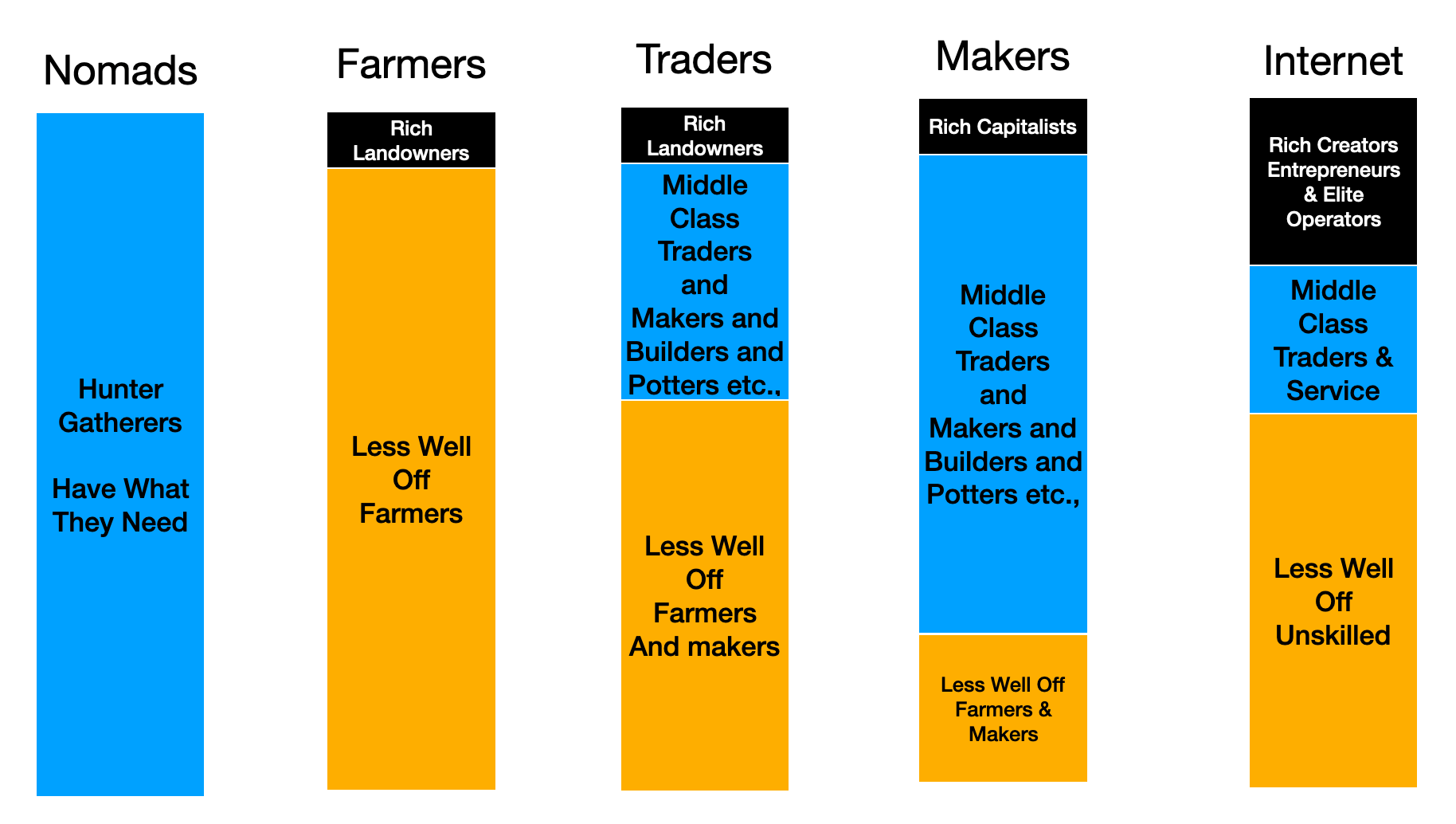
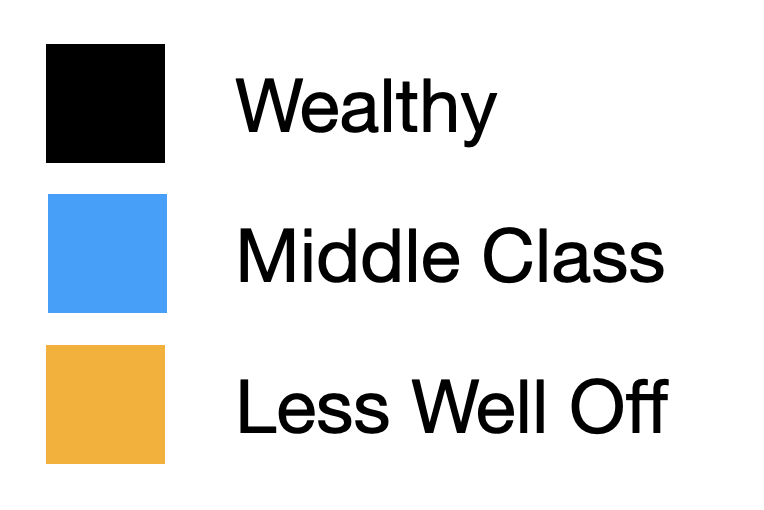
We have automation and technology on the one side, and we also see the decreasing importance of the nation state. Now it is no longer important where you you work.
Rising Living Costs and The Squeezing of the Middle Class
The middle class is shrinking, and some people are moving up to the global elite makers, and some people are left behind, falling to the less well-off – seeing rising living costs and standards of living.
Elizabeth Warren: “The middle class is getting squeezed to the breaking point.”
Joseph Stiglitz: “The middle class is disappearing in large part because the fruits of growth have gone disproportionately to the top.”
People are no longer able to be entitled to a better standard of living just because they were born in a developed country. In fact, being born in a developed company with high tax and high cost of living and inefficient government is a disadvantage during this transitional period compared to developing countries with a low cost of living and low tax rate.
During this transition people see the costs of living rise. Taxes are still high in many developed countries, and the nation states are bloated.
People are on average less well off, and so people consider they can’t afford big families. Society can’t afford more children.
Mohamed El-Erian: “We are witnessing the end of the high-growth era of cheap and abundant labor, material inputs, and capital.”
At the same time creators and builders and those that can adapt to the new economy are likely to see huge productivity increases and wealth generation
“The most valuable workers in the future economy will be those who can effectively leverage digital technology to augment their creativity and productivity.” Sovereign Individual
How to be productive and have a family?
To succeed in the digital economy and digital age, it demands much more from ourselves. Much more in terms of focus to be really excellent. Excellent performance is rewarded. We need to navigate this desire for excellence with the demands of a family. Many are choosing to focus on being more successful rather than the taking on a family.
Here are some ways to be flexible and have a family
- Flexibility: Digital age careers often offer more flexibility in terms of work hours and location. This can be an advantage for family life, as it allows for a more adaptable schedule to accommodate family needs.
- Connectivity: The ability to stay connected through digital means can make it easier to manage work responsibilities while being present for family. However, it’s important to set boundaries to prevent work from encroaching on family time.
- Productivity: Digital tools and technologies can enhance productivity, allowing for more efficient work processes. This can free up time that can be spent with family.
- Work-Life Integration: The concept of work-life balance is evolving into work-life integration, where work and personal life are seamlessly intertwined. This approach can be beneficial for those who can effectively manage their time and priorities.
- Challenges: On the flip side, the constant availability and pressure to be “always on” can lead to burnout and negatively impact family life. It’s crucial to establish limits and prioritize self-care and family time.
- Role of Employer: The culture and policies of the employer can also play a significant role in how well one can balance a successful career in the digital age with family life. Companies that support flexible working arrangements and value work-life balance can make it easier for employees to manage both.
Be ruthlessly productive and learn properly at an early age.
- Designate a Quiet Space: Create a dedicated area in your home for meditation and focused work. This space should be free from distractions and noise. Consider using noise-canceling headphones or white noise machines to block out background sounds.
- Set Boundaries: Communicate with your wife and family about the importance of uninterrupted time for focus and meditation. Set specific hours during which you should not be disturbed unless it’s an emergency.
- Schedule Mindful Activities: Plan and schedule your meditation and focused work sessions. Treat these times as non-negotiable appointments in your calendar.
- Minimize Digital Distractions: Limit your use of digital devices during your focus and meditation time. Use apps or tools that block distracting websites and notifications.
- Practice Time Blocking: Allocate specific blocks of time for different activities, including work, family time, and personal time. This helps create a balance and ensures that you have dedicated time for focus and relaxation.
- Encourage Meaningful Conversations: While it’s natural for families to discuss daily matters, encourage more meaningful conversations that align with your interests and goals. Share your thoughts on topics related to efficiency, digital age developments, or personal growth.
- Lead by Example: Demonstrate the value of focus and meditation through your actions. Show your family how these practices positively impact your productivity and well-being.
- Embrace Minimalism: Consider adopting a minimalist lifestyle to reduce clutter and distractions in your home. This can create a more peaceful and conducive environment for focus and meditation.
- Incorporate Nature: Bringing elements of nature into your home, such as plants or natural light, can enhance your meditation space and promote a sense of calm.
- Regularly Review Your Routine: Periodically assess your daily routine and make adjustments as needed to ensure that you are maintaining a balance between focus, family time, and personal interests.
At the same time having a family can help to focus and grow rather than hinder it.
How to fix this on a societal level?
In order to reorganise for the new economy government service, we need to move to make government services more efficient, reduce the tax burden, make the state and government more efficient and we need to work on training the less well off unskilled so that they can move up and contribute more.
- Education and Training: Invest in education and vocational training programs to equip workers with the skills needed for the Information Economy.
- Tax Incentives: Implement tax incentives for businesses that invest in automation and technology to encourage economic growth while ensuring job creation.
- Family-Friendly Policies: Introduce policies such as paid parental leave, affordable childcare, and flexible work arrangements to support families and encourage higher birth rates.
- Social and Cultural Adaptations: Societal attitudes towards family, work, and technology will need to evolve. Embracing flexibility, work-life integration, and lifelong learning will be important for individuals to thrive in the changing landscape.
- Global Collaboration: As the challenges and opportunities of declining birth rates and economic transitions are global in nature, international collaboration and knowledge sharing will be essential to address these issues effectively.
- Healthcare and Elderly Care: With an aging population, there will be increased demand for healthcare and elderly care services. Investing in healthcare infrastructure and developing innovative solutions for elderly care will be crucial.
- Government Policies: Governments may need to implement policies to encourage higher birth rates, such as family-friendly workplace policies, financial incentives for families, and affordable childcare. Additionally, immigration policies can also be adjusted to mitigate the effects of a declining population.
- Economic Impact: Declining birth rates can lead to a shrinking workforce, which can strain economies and social security systems. It’s important for governments and businesses to adapt to these demographic changes by investing in automation and technology to maintain productivity levels.
Related Quotes
Albert Einstein: “The hardest thing in the world to understand is the income tax.”
Winston Churchill: “There is nothing wrong with change, if it is in the right direction. To improve is to change; to be perfect is to change often.”
Thomas Paine: “Taxes are not raised for the benefit of the taxed.”
Ronald Reagan: “Inflation is as violent as a mugger, as frightening as an armed robber and as deadly as a hit man.”
Margaret Thatcher: “Inflation is the parent of unemployment and the unseen robber of those who have saved.”
John F. Kennedy: “The cost of living is going up, and the chance of living is going down.”
Alvin Toffler: “The illiterate of the 21st century will not be those who cannot read and write, but those who cannot learn, unlearn, and relearn.”
Yuval Noah Harari: “In the past, it was human labor and land that were the most important factors of production. In the future, the leading resource will be knowledge.”
Nassim Nicholas Taleb: “The three most harmful addictions are heroin, carbohydrates, and a monthly salary.”
Julian Simon: “The ultimate resource is people – especially skilled, spirited, and hopeful young people endowed with liberty – who will exert their wills and imaginations for their own benefit, and so inevitably they will benefit the rest of us as well.”
Malcolm X: “Education is the passport to the future, for tomorrow belongs to those who prepare for it today.”
Balaji “The mobile internet, cryptocurrency, and AI are technologies that enable the exit from the physical to the digital.”
Soverign Individual Book “As information technology demassifies communication, shifts economic power to the individual, and permits new forms of competition, it will undercut the nation-state’s power to tax, censor, and control the economy.”
Recommended Books:
- Read more about the Sovereign individual here.
- “The Fourth Industrial Revolution” by Klaus Schwab: This book discusses the impact of emerging technologies on economies and societies, providing insights into the Information Economy.
- “The Second Machine Age: Work, Progress, and Prosperity in a Time of Brilliant Technologies” by Erik Brynjolfsson and Andrew McAfee: This book explores how digital technologies are transforming business, the economy, and society.
- “Capital in the Twenty-First Century” by Thomas Piketty: While not focused solely on the Information Economy, this book offers a comprehensive analysis of wealth and income inequality, which are relevant issues in the context of economic transitions.
- “The Great Leveler: Violence and the History of Inequality from the Stone Age to the Twenty-First Century” by Walter Scheidel: This book provides a historical perspective on inequality, which can complement the understanding of economic transitions and their social impacts.
